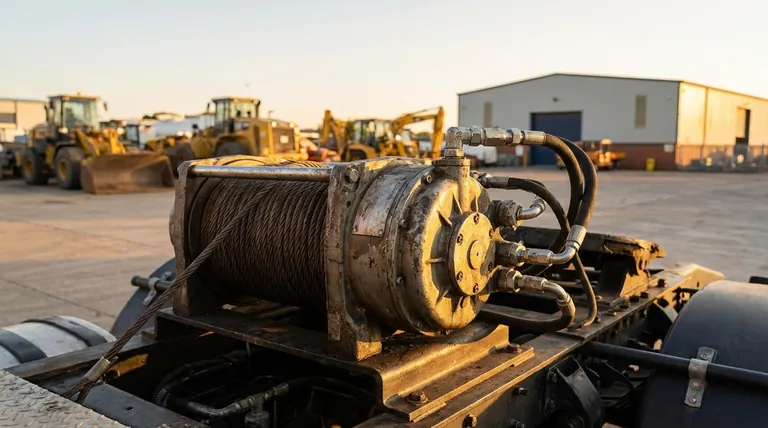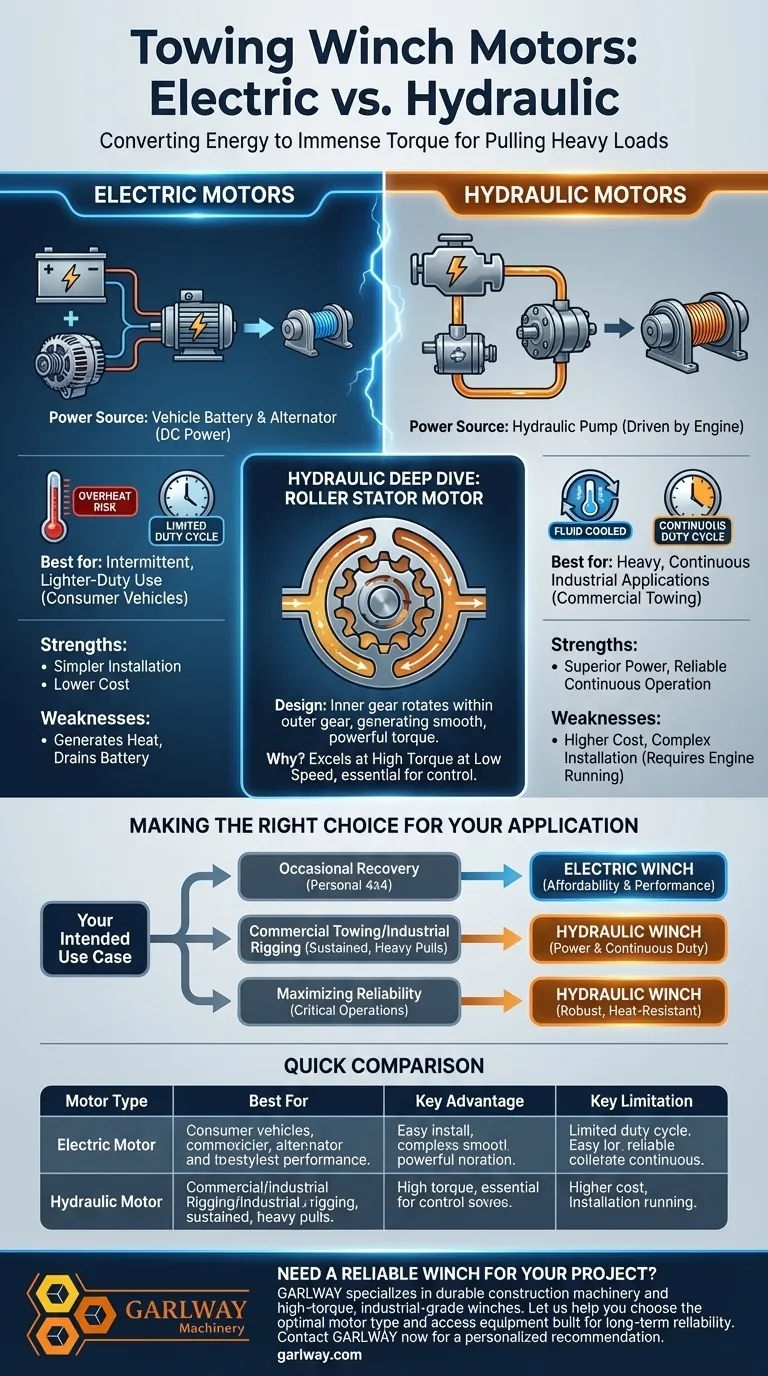At its core, a modern towing winch is powered by one of two types of motors: electric or hydraulic. These systems convert either electrical energy or fluid pressure into the immense rotational force, or torque, needed to pull heavy loads. While older, manual winches existed, the integration of these motors is what defines modern high-capacity towing equipment.
The choice between an electric and hydraulic motor is the defining factor in a winch's performance. Electric motors are suited for intermittent, lighter-duty use, while hydraulic motors are the standard for heavy, continuous industrial applications.

The Two Primary Motor Types
The motor is the heart of the winch, directly determining its power, duty cycle (how long it can run), and ideal application. Understanding the fundamental difference between the two main options is critical.
Electric Winch Motors
Electric motors are the most common type found on consumer vehicles like trucks and Jeeps. They are self-contained units that draw a significant amount of direct current (DC) power from the vehicle's battery and alternator.
These motors are favored for their relative simplicity and ease of installation. However, they are limited by the vehicle's electrical system and can overheat if used for long, continuous pulls.
Hydraulic Winch Motors
Hydraulic motors are designed for heavy-duty commercial and industrial applications. They are not powered by the battery but by a hydraulic pump, which is typically driven by the vehicle's running engine (often integrated with the power steering pump).
This design allows for a much longer and more powerful duty cycle. Because they are cooled by the hydraulic fluid circulating through them, they can operate continuously under heavy load without the risk of overheating that electric motors face.
A Deeper Look at Hydraulic Motor Design
For the most demanding jobs, the specific design of the hydraulic motor is what delivers the necessary power and control.
The Role of the Roller Stator Motor
Many high-torque hydraulic winches use a specific type of motor called a roller stator hydraulic motor. This design is highly efficient at converting hydraulic fluid pressure into mechanical power.
It operates on a principle similar to a gerotor, where an inner gear rotates inside an outer gear. The pressure of the hydraulic fluid forces this rotation, generating smooth and powerful torque.
Why This Design Provides High Torque
The primary job of a winch is to produce high torque at low speed. The roller stator design excels at this.
By precisely controlling the flow of hydraulic fluid, these motors can generate immense pulling force with a high degree of control, which is essential for safe and effective winching operations.
Understanding the Trade-offs
Choosing a winch motor is not about which one is "better" overall, but which is better suited for a specific task. Each type comes with distinct advantages and limitations.
Strengths of Electric Winches
Electric winches are generally less expensive and significantly easier to install than hydraulic systems. They can also be operated for short periods even if the vehicle's engine is not running, drawing power directly from the battery.
Weaknesses of Electric Winches
Their main drawback is a limited duty cycle. They generate immense heat and can quickly drain a battery or overload an alternator during a difficult pull. They are not intended for continuous, industrial use.
Strengths of Hydraulic Winches
Hydraulic winches offer superior power and a near-constant duty cycle. As long as the engine is running to power the pump, the winch can pull without overheating. This makes them exceptionally reliable for the toughest jobs.
Weaknesses of Hydraulic Winches
The primary disadvantages are cost and complexity. Installation is more involved, requiring tapping into the vehicle's hydraulic system. They also cannot operate unless the engine is running to power the hydraulic pump.
Making the Right Choice for Your Application
Your intended use case is the single most important factor when deciding between motor types.
- If your primary focus is occasional recovery for a personal 4x4 or truck: An electric winch provides the best combination of affordability, performance, and straightforward installation.
- If your primary focus is commercial towing, industrial rigging, or any application requiring sustained, heavy pulls: A hydraulic winch is the only appropriate and reliable choice for its power and continuous duty cycle.
- If your primary focus is maximizing reliability for critical operations: The robust, heat-resistant nature of a hydraulic system makes it the superior option for professional use.
Ultimately, matching the motor's capabilities to the demands of the job ensures safe, effective, and reliable performance.
Summary Table:
| Motor Type | Best For | Key Advantage | Key Limitation |
|---|---|---|---|
| Electric Motor | Consumer vehicles, occasional recovery | Easy installation, lower cost | Limited duty cycle, can overheat |
| Hydraulic Motor | Commercial/industrial, continuous heavy towing | High torque, continuous operation | Higher cost, requires engine running |
Need a Reliable Winch for Your Project?
Whether you're outfitting a fleet of service trucks or equipping a single vehicle for tough jobs, selecting the right winch motor is critical for performance and safety. GARLWAY specializes in durable construction machinery, including robust winches designed for construction companies and contractors worldwide.
We can help you:
- Choose the optimal motor type (electric or hydraulic) based on your specific duty cycle and load requirements.
- Access high-torque, industrial-grade winches built for continuous operation and long-term reliability.
- Ensure your equipment is matched perfectly to your application, maximizing efficiency and minimizing downtime.
Get a personalized recommendation and quote today. Our experts are ready to discuss your needs and ensure you get the right winch for the job.
Contact GARLWAY now to power your projects with confidence!
Visual Guide

Related Products
- Ready Mixer Machine for Construction Ready Mix Machinery
- Heavy Duty Electric Boat Winch Windlass Anchor
- Portable Electric Concrete Mixer Machine for Cement Mixing
- Commercial Electric Concrete Mixer Machine HZS 50 Small Batch Plant for Sale
- Electric and Hydraulic Winch for Heavy Duty Applications
People Also Ask
- Why is cleaning a concrete mixer after use important? Avoid Costly Repairs and Ensure Quality
- Can a concrete mixer be used for mortar? Understanding the trade-offs for your project
- What was significant about Roscoe Lee's 1934 concrete mixer design? Pioneering Modular Construction Equipment
- Why is the manufacturer's strength and service important when choosing a concrete mixer? Ensure Long-Term Project Success
- What should be considered regarding the output of a concrete mixer? Match Capacity to Your Project Scale












